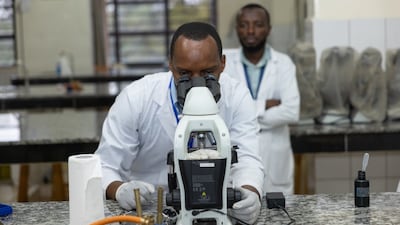Global Vision
BMS has launched a new cancer drug access program for low-to-middle income countries, focusing on addressing health inequities and widening accessibility.
Taylor Wessing investment partners share their thoughts about market trends, the surge in AI interest and the new UK government’s approach to the life sciences agenda.
The recent Women in Advanced Therapies Global event, delivered via an interactive 24-hour platform, hosted a number of biopharma speakers who drew on personal and industry-wide experiences, all aligned by a desire to break biases.
Novartis leads the fight against malaria, pioneering innovative studies in sub-Saharan Africa to combat parasite resistance to current antimalarials.
With ustekinumab biosimilars set to launch in Europe imminently and in the US early next year, the off-patent industry may be wondering whether it will be in for a rerun of its experiences with competition on Humira – or whether the landscape has changed sufficiently to allow for different pricing and uptake trends.
Ali Pashazadeh, CEO, chair and founder of Treehill Partners discusses the need for increased communication between biotech and biopharma.
Medtech companies have typically seen a “mixed picture of growth” in China in the past year or two, but it is a market that requires ongoing commitment, a panel of experts argued at the MedTech Forum 2024.
Poland is slowly expanding beyond its position as a central European generics hub. More established companies are adding innovative medicine pipelines and a small number of biotechs are making international deals.
According to China Pharmaceutical Innovation and Research Development Association, in the first quarter of 2024 a total of 44 cell therapies in the domestic cell therapy field made clinical application progress, including 28 immune cell therapies and 16 stem cell therapies.
Sandra von Meier, head of business development and licensing at Debiopharm explains how the company’s distinctive licensing business model is helping bring new drugs to market.
Medical devices selected for use in the Guangdong-Hong Kong-Macao Greater Bay Area may potentially be fast-tracked for adoption across mainland China, according to a new industry white paper.
After decades of lackluster start-up innovation despite award-winning science, Japan’s government and big pharma players are taking steps to spur biotech growth.
Estonia is hoping to create a brighter future by attracting leading startups to its borders, a process that will bring tax revenues, jobs and infrastructure.
Breathomics, UTI diagnosis and advanced wound healing innovations were among the center stage technologies at BioWales in London 2024.
Wales must be better at adoption, said Mike Emery, the Welsh government’s digital and innovation officer for health and social care, in conversation with In Vivo.
Could health sector players encounter issues similar to those facing Tesla in China, a country which virtually saved the electric vehicle maker but where it is now facing challenges? Are there any lessons to be learned from a success story under China's volume-based procurement scheme? A partner at EY looks at these and other issues.
Leadership succession is proceeding within South Korean pharmaceutical corporations such as Daiichi Sankyo Korea, Astellas Pharma Korea, Kyowa Kirin Korea as well as MSD Korea.
The FDA and EMA have shared perspectives on the parallel scientific advice pilot for complex generics. Now industry stakeholders discuss whether transatlantic convergence is possible or merely a good idea on paper.
The journey to Net Zero, described as ‘the defining issue of our time,’ will get harder in the coming decade. Failure to keep up the pressure will result in more long-term health conditions, increasing deaths and higher costs. The UK NHS is a Net Zero exemplar globally, but without a systemic approach, its compliance efforts could stutter.




















